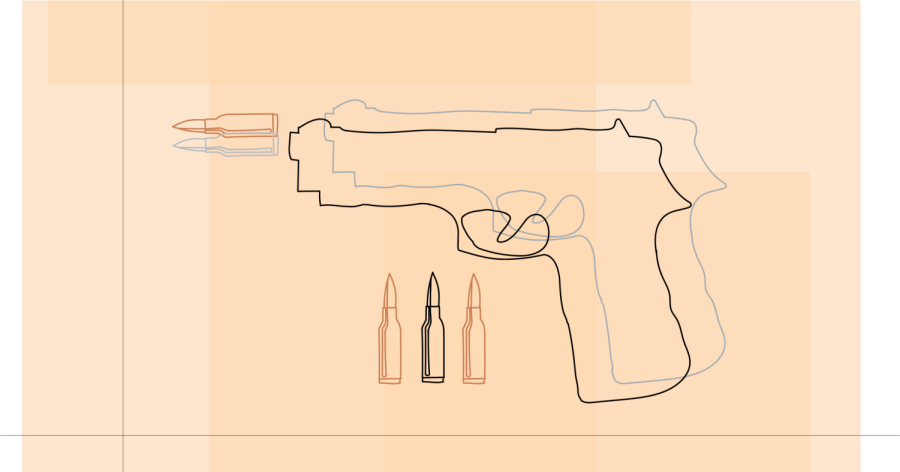U Student Victims of Gun Violence and the Impact of their Deaths
(Graphic by Emily Christensen | The Daily Utah Chronicle)
November 17, 2021
In the past five years, six University of Utah students have been killed: ChenWei Guo, Lauren McCluskey, Sarah Hawley, Mackenzie Lueck, Ty Jordan and Aaron Lowe. Five of these deaths were directly related to firearms.
During an attempted carjacking, Guo was shot and killed on Oct. 30, 2017 by Austin Boutain. As an international student from China majoring in pre-computer science, he was expected to graduate in 2019.
McCluskey was a 21-year-old track athlete and communications major at the U who faced repeated threats from her ex-boyfriend, Melvin Rowland. After her numerous requests for protection from 37-year-old Rowland and for help from the police department were disregarded, Rowland stalked, shot and killed her on Oct. 22, 2018.
On Jan. 27, 2019, 27-year-old Hawley was fatally shot by her 30-year-old boyfriend, Travis Geddes. As a physician at the University of Utah hospital, her focuses included women’s health, pediatric care and wilderness medicine.
Jordan died of an accidental self-inflicted gunshot wound to the abdomen on Dec. 26, 2020, at 19 years of age. As a running back, he was named the Pac-12 offensive freshman of the year, alongside being selected to be part of the all-conference second-team.
Most recently, 21-year-old Lowe was shot and killed on Sept. 26, 2021 at a house party in Sugarhouse. In his third year on the U’s football team, he played defensive back. He was close friends with Jordan and had even switched his number from 2 to 22 to honor him upon Jordan’s death, and was the first recipient of the Ty Jordan Memorial Scholarship.
Suicides, homicides, school shootings and domestic violence, among others, are all facets of gun violence. All instances of gun violence resulted in 36,933 deaths in the United States in 2021 as of Oct. 28, which correlates to over 122 firearm-related deaths a day.
When contrasted with 2019, Utah had a 45% jump in homicides in 2020. Additionally, 80% of Utah firearm deaths were suicides. Sometimes homicides and suicides are combined, like when an individual kills another and then themselves, and firearms are often the weapons utilized to perform such an action.
During the COVID-19 pandemic, gun sales and ownership rates spiked. Compared to 32% in 2016, 39% of American households now possess firearms, as demonstrated by the General Social Survey, a biannual poll conducted by the University of Chicago.
Sonia Salari, a professor in the College of Social and Behavioral Sciences at the U, is the co-founder of the Gender-Based Violence Consortium, project director of the Office of Violence Against Women Campus Prevention Grant and serves as chair for the Utah Domestic Violence Coalition.
“I’ve been very concerned about future gun violence, due to a vast number of new applications for FBI background checks, an indicator of increased access to firearms during the pandemic,” she said. “For example, in 2018, we had about 300,000 background checks accompanying new gun applications in our state. This amount increased to over 800,000 in 2019 and 1.2 million in 2020. This is a trend across the U.S., but Utah has seen one of the most dramatic increases.”
Additionally, from the five gun violence cases above, two are situations in which men murdered a previous or current romantic partner. According to the Educational Fund to Stop Gun Violence, in approximately half of women’s homicides in the U.S., the killer is a current or former intimate partner.
“Firearms play a large role in homicides,” Salari said. “Men are more likely to be murdered than women, and their offenders tend to be a male acquaintance or stranger. Most murders of women are at the hands of a current or former intimate partner — someone who should love them — and mostly from within their own household. Non-binary and LGBT individuals have also been vulnerable to lethal violence, such as the women killed in Moab, which looks like a hate crime.”
Witnessing, being part of the community affected or hearing of incidents such as those listed above can take a toll on students. Mental health may be negatively affected by firearm violence and daily life may be impacted.
David Hemenway, in association with the Harvard School of Public Health, wrote a paper that examines the correlation between street violence and its impacts on psychiatric, emotional, behavioral, and physical health problems.
“Psychiatric problems include posttraumatic stress disorder (PTSD), depression, anxiety, intrusive thoughts, sleep problems, and personality change,” the paper reads. “Emotional problems include anger, nervousness, withdrawal, loneliness, and despair. Behavioral problems include low academic performance, risky sexual behavior, substance abuse, delinquency, and violence. Finally, exposure to violence has been linked to such health problems as asthma, heart disease, and low-birth-weight babies.”
To aid students and support their mental well-being, the U’s Counseling Center offers individual counseling, group counseling, psychiatric medication services and the Mindfulness Center in addition to crisis services.
Experiencing this range of reactions in response to gun violence-related traumatic events is entirely normal. Each person reacts differently, but the way one approaches the healing process can be instrumental to a successful journey to recovery.
In an email interview, Lauren Weitzman, director of the Counseling Center and a licensed psychologist, said it is important to stay connected with those who can offer important social support.
“Try to stick to your routine, with an emphasis on getting regular physical activity and sleep, and eating healthy meals,” Weitzman said. “Have a list of your favorite coping strategies handy to help you relax and wind down. And, don’t hesitate to reach out for help if you have difficulty managing your daily activities.”
For those experiencing domestic violence, the UDVC 24-Hour LINKLine can be reached at 1-800-897- 5465 or visit their website. For U students in need of mental health services, they can reach the 24/7 Crisis Line affiliated with the counseling center at 801-587-3000 or take advantage of any of their services listed above.









John Hedberg • Nov 24, 2021 at 5:48 am
Healing the violent takes love, and that’s healthy. Anything can be a tool of violence if someone, in their mental or emotional distortion, chooses to use it for one: a knife, a hammer, a skateboard, medication, an SUV, all of these and a million more things can be used for violence. You can’t outlaw every tool that helps us thrive and flourish. We need to help untie the distorted mental knot which leads to violence, and that means love focused on people. That love keeps us all healthy and thriving.
All the Best,
J Hedberg